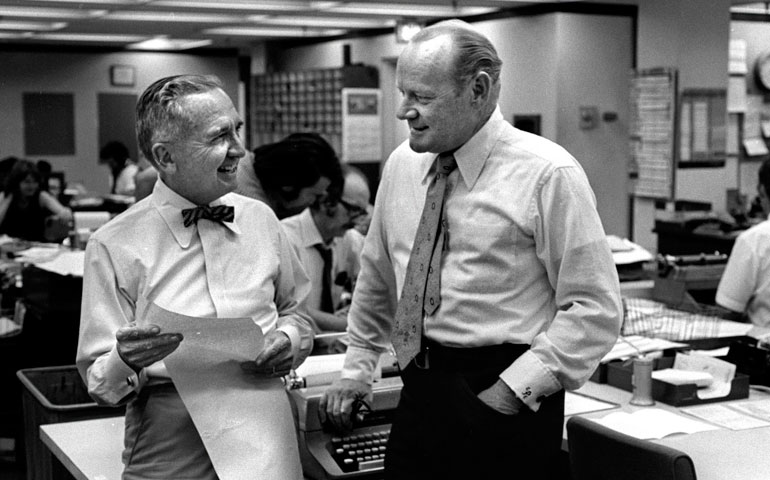
Eugene Patterson, right, talks with St. Petersburg Times publisher Nelson Poynter in the Florida paper’s newsroom in 1974. (Newscom/ZUMAPRESS.com/St. Petersburg Times/Tamba Bay Times)
A half-century ago in the nation's Deep South, a mixture of white mobs and thugs was venting its racism by bombing or burning black churches, killing or jailing civil rights workers and electing supportive politicians who stood with Alabama's Gov. George Wallace and his hate-based call, "Segregation now, segregation tomorrow, segregation forever."
In the midst of it was Eugene Patterson, whose loyalties to the region went back to growing up as a white Georgia farm boy. His strongest loyalty, though, was elsewhere: to the ideals of racial equality. His recent death at 89 in St. Petersburg, Fla., was a moment for the country to remember one of the lustrous titans of American journalism. He practiced a craft at a time when newsroom bravery meant producing copy that put your life and family at risk. The same gunmen and arsonists taking aim at the civil rights flank could as well bring down its media supporters.
From 1960 to 1968, Gene Patterson served as the editor of The Atlanta Constitution. Other Southern newsmen -- Hodding Carter II of Mississippi's Delta-Democrat Times and Claude Sitton of the Raleigh News and Observer -- shared his progressive commitments but it was Patterson who had the widest readership and most visible platform. His editorial page columns opened minds and stirred hearts. Among the treasures was "A Flower for the Graves," written on Sept. 16, 1963, after four girls were martyred in Alabama: "A Negro mother wept in the street Sunday morning in front of a Baptist Church in Birmingham," it began. "In her hand she held a shoe, one shoe, from the foot of her dead child. We hold that shoe with her. Every one of us in the white South holds that small shoe in his hand."
By luck or providence, it was about then that I came to know Gene Patterson. On his occasional downtime, he slipped out of Atlanta to spend a day at the Trappist Monastery of the Holy Spirit, an hour and another world away in Conyers, Ga. I was a lay brother from 1960 to 1965 in the community of about 80 members.
A building program was in high gear, with priests and brothers doing the heavy labor of construction. Patterson, in dungarees and sweatshirts, came in as a helper, pushing wheelbarrows of cement up ramps, hauling lumber and taking orders from the cellarer.
In addition to savoring the manual labor -- and it was laborious in the summer heat of central Georgia -- Gene Patterson had another reason for helping: hard news for his columns. Churches with black congregations were being burned throughout the state. The Holy Spirit abbot, Dom Augustine Moore, an enlightened liberal in an order not known for tacking left, began sending teams of priests and brothers to help rebuild the churches. The major contribution was stained glass windows, made at the monastery by a priest who knew what he was doing.
I never learned, or cared to, if Dom Augustine was rebuked by the Trappist abbot general in Rome for end-running the order's strict rules for cloister. I did know that some of the older members of the community, protectors of the penitential way, saw the day trips to the churches as a major deviancy from the contemplative life. Walled-in prayer and silence was the Trappist way for nearly 10 centuries, why stray now?
Because communication was strictly by sign language, the Trappist version, I never had an oral conversation with Gene Patterson during his visits. He did stroll once to the dairy barn where I was the head manure-shoveler and the low man on the 2 a.m. to 2 p.m. milking crew. Amid the Jersey cows, bulls and heifers, he waved. I was tempted to hand him a shovel, to get the full experience of it all, but I went with a return wave -- an easy sign in the Trappist dialect.
Deciding not to take final vows, I went to see Gene at the Constitution. He had seen some articles I had written for The Christian Century and The Critic but, gracious as can be, said he had no openings at the paper. He made a call to the United Press International bureau in New York where a night copy editor job was vacant. At $90 a week, I jumped at it.
Three years later, Gene came to The Washington Post as the managing editor. We renewed our friendship and with him as a recommending tailwind I wafted into the Post to write columns and editorials. However much thanks I owed him, the payment would never have been enough.
[Colman McCarthy directs the Center for Teaching Peace in Washington and teaches courses on nonviolence at four universities and two high schools.]




